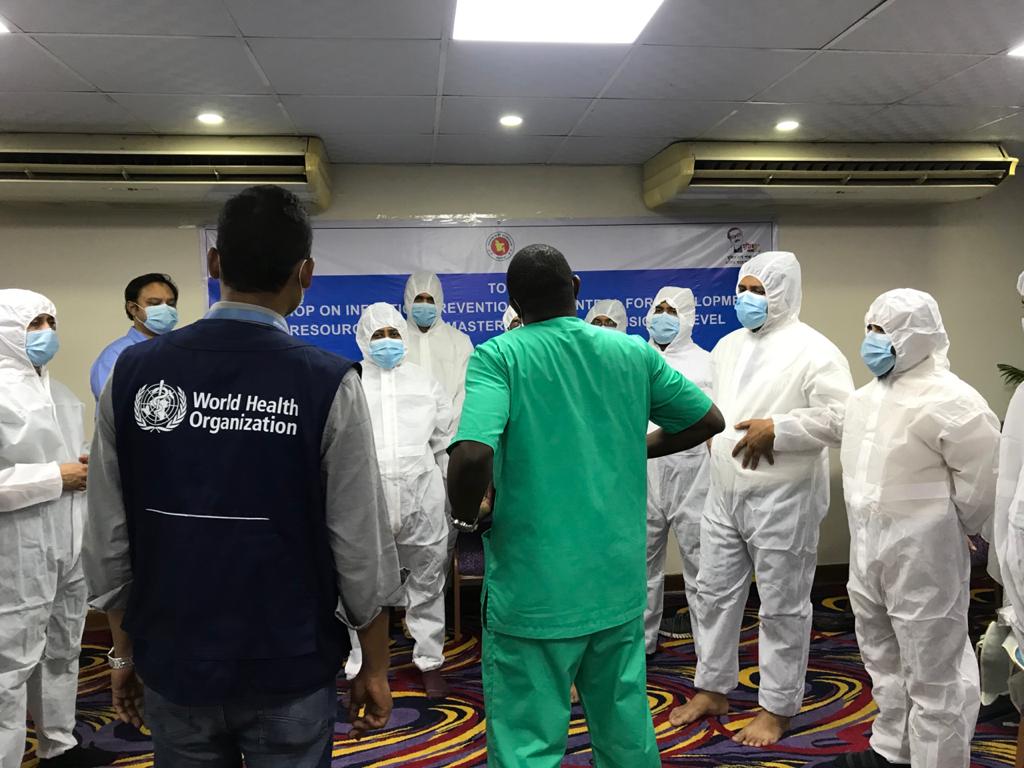Infection prevention and control (IPC) is a practical, evidence-based approach that ensures safety and quality of care and prevents patients and health workers from being harmed by avoidable infections. Without effective IPC, it is impossible to achieve quality health care delivery.
Effective IPC requires constant action at all health system levels, including policymakers, facility managers, health workers, and patients who access health services. IPC affects all aspects of health care, and at every health care interaction, including hand hygiene, surgical site infections, injection safety, antimicrobial resistance and how hospitals operate during and outside of emergencies.
To help in this fight, the WHO is supporting the government of Bangladesh with comprehensive training on infection prevention and control. Two batches of four days each, from 8 to 11 March and from 13 to 16 March 2021, the Directorate General of Health Services (DGHS), with WHO technical assistance, trained 65 physicians and nurses from medical college and district hospitals under eight division.
.jpg?Status=Master&sfvrsn=afd9c50b_7) Photo WHO Bangladesh
Photo WHO Bangladesh
“The importance of infection prevention and control when dealing with patients is very often underestimated, but we know what significant role it plays in the safeguard of patients as well as healthcare workers”, said Dr Bardan Jung Rana, WHO Representative to Bangladesh, during the inaugural session of the training. The Covid-19 pandemic has stressed and reiterated how vital IPC is in managing communicable disease threats to the community. A recent survey shows that only 18.3 per cent of doctors, nurses and midwives have been trained on IPC practices. “Throughout the world”, Dr Rana continued, “we have witnessed less compliance and adherence to IPC standards and norms, which has inevitably resulted in increased exposure of patients and healthcare workers to infections, a peak of morbidity and mortality rates, and a weighting of the economic burden”.
.jpg?Status=Master&sfvrsn=9b5f7b8d_7) Photo WHO Bangladesh
Photo WHO Bangladesh
When IPC standards are not respected, the most frequent adverse event is the healthcare-associated infection contracted by patients while receiving healthcare. It is estimated that 1 in every 10 patients is affected by healthcare-associated infection worldwide. Out of every 100 patients, 7 in developed and 15 in developing countries will get at least one healthcare-associated infection. In high-income countries, up to 30% of patients are affected by at least one healthcare-associated infection in intensive care units; in developing countries, the frequency is 2 to 3 times higher.
When talking about IPC practices, we address washing hands with soap and water, hand rubbing, and adequately using masks and personal protective equipment. Although they are simple to adopt, on average, 61 per cent of healthcare workers do not adhere to recommended basic hand hygiene practices.
Professor Dr Khurshid Alam, Director General (DG) of DGHS, reiterated the importance of IPC. “It is essential”, he stated, “that all staff levels are aware of IPC measures. They must learn and be committed and devoted to the work they do. There is no alternative to IPC practices in all clinical settings, and all health care worker must be vigilant for this. We highly appreciate WHO’s support in building the national capacity on IPC; this is an essential matter, especially during emergencies like this”.
.jpg?Status=Master&sfvrsn=65d142bc_13) Photo WHO Bangladesh
Photo WHO Bangladesh
Since the very beginning of the Covid-19 pandemic, the WHO has been supporting the Ministry of Health and Family Welfare in developing the Bangladesh Preparedness and Response Plan for Covid-19 to coordinate coherent, synergistic and efficient response interventions, such as IPC measures, case management, adoption of hygiene practices in all public places, surveillance, and community-based prevention practices, like risk communication, disease identification and quarantining, and social distancing. The WHO has prioritized safety and preventive measures to curb the further spread of the infection, and with IEDCR, has strengthened contact tracing methods.
“There is considerable risk of getting infections through health care services”, said Dr Bhupinder Aulakh Kaur, Deputy WHO Representative, during the closing session of the training. “IPC is a priority also in the strategy to prevent healthcare-associated infection, including Covid-19. We have supported the government in developing two national guidelines to set the IPC practices standards and run clinical governance, monitor and supervise these IPC practices at the facility level. These national capacity building activities are part of the Intra Action Review of Covid-19 response under International Health Regulations. The government of Bangladesh is making an outstanding effort in vaccinating a considerable number of citizens, but we still have a long way to go. It is fundamental that, along with the vaccinations, we keep adhering to IPC practices. This should be the new normality for patients, but above all, healthcare workers, to protect themselves, their families, and their communities.”
 Photo WHO Bangladesh
Photo WHO Bangladesh
As part of the response efforts, the WHO has also facilitated the provision of 200 oxygen concentrators, 400 pulse oximeter, 100 venturi masks, and 100 Nasal cannulas across 17 district hospitals and provided 65 patient monitors to 10 tertiary level health facilities.
Many materials, including manuals and videos, have been prepared in Bangla to be distributed to frontline healthcare workers. Thanks to the collaboration with DGHS, we conducted advocacy workshops on monitoring and supervising IPC practices in 15 district hospitals.
Activities like this master pool of experts offer the unique opportunity to reach more and more healthcare workers at all levels. WHO is committed to keeping cooperating and supporting the government of Bangladesh in building a robust national IPC system.
